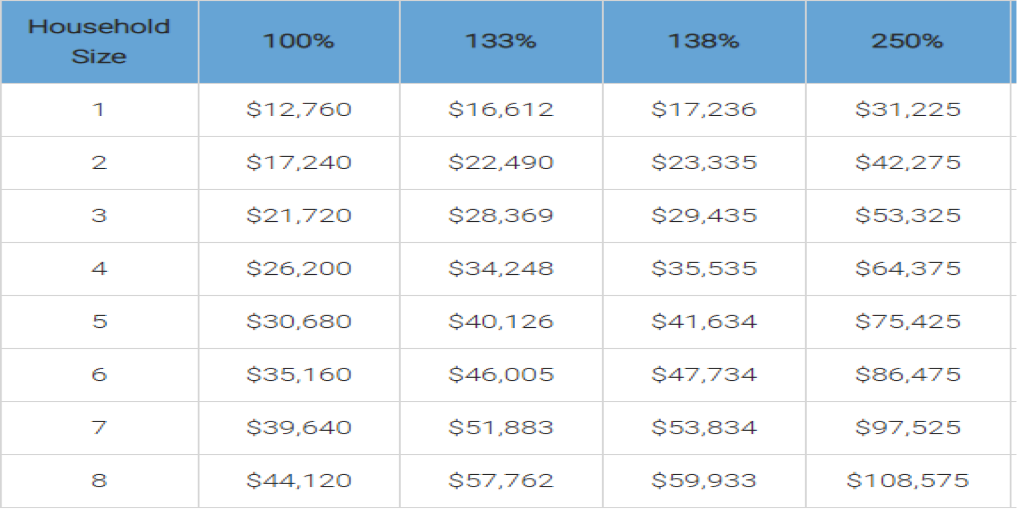Proving you are not a public charge
If you are in the process of applying for a green card, you will want to know as much as possible about the new public charge rule.
The Trump Administration has passed a rule making it harder for immigrants to prove they financially qualify for a green card. Now, during the global Coronavirus pandemic, many immigrants are worried that if they ask for government benefits they will be deemed a public charge.
Read below to find out more about the meaning of public charge, how it applies in your case.
UPDATE: July 30, 2020. A federal judge enjoined (paused) immigration from implementing the new public charge rules. because of the pandemic It is unclear how immigration will respond to this court order. Please continue to visit our page for updates. For now, it is helpful to review the information below so that you understand how the public charge rule will affect your case later on.

What is the public charge rule?
The public charge rule applies when you apply for a lawful permanent resident card (green card). Part of the process requires that you show it’s unlikely you’ll need government assistance in the future. Meaning, the government wants you to show you won’t become a “public charge.”
Here is an easy way to remember the meaning of “public charge”: immigration doesn’t want the “public” to be in “charge” of taking care of you financially after they approve your case. In other words, when you apply for a green card you’ll need to show it’s likely that you’ll be able to support yourself without needing the government to help you.
When does the public charge rule apply?
The public charge rule applies when you’re trying to get a green card. So during the application process to get your green card, immigration officers will review your case. This is when the rule will be used.
There are two possible government agencies involved when you process your green card application. The first agency is the United States Citizenship and Immigration Service (USCIS). This agency reviews all green card applications inside of the United States. The U.S. Department of State (DOS) reviews all applications outside of the United States.
Both agencies, USCIS and DOS, apply the public charge rule and both do it under the same standard of review, a Totality of the Circumstances approach.
The Totality of Circumstances Approach
In deciding whether you’re a public charge, USCIS and DOS will look at the “Totality of Circumstances.”
Simply stated, “totality of the circumstances” means that USCIS and DOS weigh both positive and negative factors when they apply the public charge rule. The law gives immigration officers some guidance on how to do this. The law says that officers should should look at things like a person’s Age; Health; Family status; Assets, Resources, and Financial Status; and Education and Skills.
For example, someone who is young, healthy, has an education from a university, speaks English as his/her native language and has a job offer in the U.S. would be looked at favorably by an immigration officer under the public charge rule. That said, there are some factors that the law says are weighted “heavily” under the Totality of the Circumstances. This means, they are big deals when USCIS or DOS reviews a case.
Heavily Weighted Factors
Heavily Weighted Positive Factors
We’ll start with the heavily weighted positive factors. First, if by yourself, or with the people in your home, you legally earn 250% above the poverty guideline then that’s a great thing. To find out if you do, count the number of people who live in a home and look at the chart below.

It’s helpful to use an example to explain. Looking at the chart, if you are working lawfully in the U.S., live with your spouse and two children then your household size would be 4. Using the chart, if you earn more than $64,375 a year then that’s a very good thing in your case.
Another heavily weighted positive factor is if you have private health insurance. Note, this does not include private health insurance if you receive money through the Affordable Care Act, otherwise known as “Obamacare.” For example, if you pay for your own health insurance with no government assistance then immigration will view that as a very good thing.
Heavily Weighted Negative Factors
The big thing to be worried about is if you get government assistance for more than 12 months within a 36-month period. The law refers specifically to you (the Applicant for a green card) and not any of your family who is present in the U.S. lawfully.
For example, let’s say you apply for a green card, are married to a U.S. citizen, and you have one U.S. citizen child. Your U.S. citizen spouse and child can receive government assistance without it counting towards the 12 months mentioned above. But if you get government assistance, then that would count towards the 12 months.
The important question is whether the government assistance is given directly to you, the Applicant. If so, then it could be viewed very badly in immigration’s eyes.
Which public benefits count and don’t count towards the 12 months?
To better understand the question of receiving government assistance, it’s helpful to give you a list of pubic benefits that the law says do and don’t count towards the 12 months. This is particularly important in light of these difficult economic times.
The following benefits DO count towards the 12 months:
- Any Federal, State, local, or tribal cash assistance for income maintenance
- Supplemental Security Income (SSI)
- Temporary Assistance for Needy Families (TANF)
- Supplemental Nutrition Assistance Program (SNAP)
- Section 8 Housing Choice Voucher Program
- Section 8 Project-Based Rental Assistance, and
- Medicaid
The following benefits DO NOT count towards the 12 months:
- Benefits received by U.S. military service members or their family
- Medical benefits received for an emergency medical condition (“emergency” is defined by law)
- Services or benefits under the Individuals with Disabilities Education Act (IDEA)
- School-based services or benefits if you’re at or below the age eligible for secondary education
- Benefits received by anyone under 21 years of age
- Medical benefits received by a woman during pregnancy (and during the 60-day period beginning on the last day of the pregnancy)
- Earned government benefits including: Federal and State retirement, Social Security retirement benefits, Social Security Disability, Post-secondary education, Unemployment benefits as public benefits.
How to Help My Case
There are several things you can do to help your case so that you’re not found to be a public charge. Here are a few:
- If you do not speak English, then register for language classes such as English as a Second Language (ESL). Many times cities offer these courses free.
- Job skills classes are also an option. Take classes to learn computer or other useful skills to help find employment. Attempt to get a certificate of completion of any such course.
- Obtain a license for a specific occupation such as electrician or welding. Make sure to get proof of this certification.
- Get private health insurance without government help. The insurance does not need to be great insurance just something to cover you in case you get very sick.
The best practice is for you to view this process as a job interview with USCIS or DOS (immigration). In other words, do anything you can (within reason) to make yourself a better candidate for a job in the U.S.
New Forms Needed to Show You're Not a Public Charge
As mentioned, there are two agencies that will apply the public charge rule, USCIS and DOS. To review, USCIS decides applications for green cards when requested inside the U.S. and DOS decides applications outside of the U.S.
Each one asks for information on different forms. Let’s look at them now.
If you are adjusting your status, use Form I-944
When someone applies for a green card from within the U.S., the process is called “Adjustment of Status” or AOS. To apply for Adjustment use a Form I-485, which you can learn about here. Part of the AOS process requires that you complete a new form, I-944, Declaration of Self-Sufficiency.
The form I-944 is a 20 page form that asks for things like income, assets, education, and information on receipt of public benefits. Interestingly, the form also asks for information about individuals who live in the home with you. These are referred to as “household members.”
The form asks for many, many details. However, it is important to note that some of the requested information does not apply in every case. Therefore, some sections of the form will not need to be completed.
If you are consular processing, use Form DS-5540
When you apply for an Immigrant Visa (green card) with DOS the process is called “Consular Processing” or CP. There are many steps to consular processing. As part of the process, you may have to complete the DS 5540. This form is only 4 pages long and focuses mainly on work and income history, if you or a household member received government benefits and whether you have or can get health insurance.
Effect of getting government help during the pandemic
If you get help from the government during the global coronavirus pandemic, you may wonder if it’ll make you a public charge. It depends.
Yes, in the sense that any government benefit will have some effect, large or small, when USCIS or DOS applies the public charge rule. No, in the sense that immigration officials have said they will allow submission of a written statement explaining that government benefits were requested because a city or state forced businesses to close due to the Coronavirus.
In other words, if the city where you live ordered its businesses closed and you lost income or, worse, lost your job, then immigration will allow you to explain that this is the reason for receiving the government benefit.
Note, it’s very important to get an official explanation of the amount, duration and the type of financial aid received from the government. This is critical because when you apply for a green card you can present that explanation to USCIS or DOS to show the government benefit received was only for a short period of time and due to the Coronavirus.



